More needs to be done: Better breast cancer treatment, care pushed
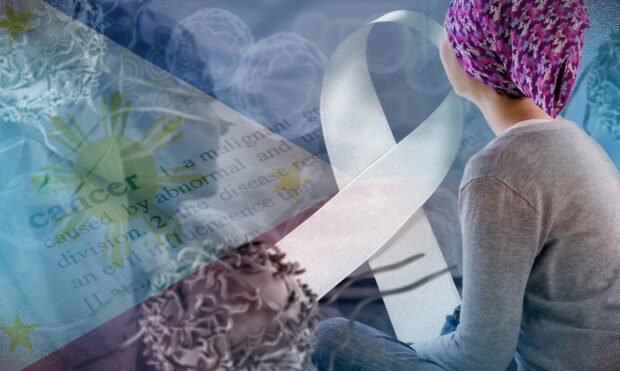
COMPOSITE IMAGE JEROME CRISTOBAL FROM INQ STOCK PHOTOS
MANILA, Philippines—In the past years, experts said much has already been achieved in terms of finding better treatment and care for breast cancer patients in the Philippines. Still, doctors, support groups, and lawmakers continue to push for more improvements.
In the Philippines, breast cancer is the leading type of cancer and is the most common cancer among women of all ages. There were 27,163 cases of breast cancer recorded in the country in 2020, while 9,926 Filipino women died of the disease.
Previous data by the Department of Health (DOH) showed that 3 in every 100 women in the country will be diagnosed with breast cancer in their lifetime. While women have a higher risk, the Philippine Cancer Society noted that the disease does not spare men—at least one in 1,000 men will have breast cancer in their lifetime.
In the past years, various types of treatments for breast cancer have been introduced and made accessible for patients in the country.
More recently, a type of breast cancer treatment called targeted therapy—which uses targeted drugs or medicines that work differently than standard chemotherapy drugs—was made available in the country.
Article continues after this advertisementCurrently, there are 23 public hospitals that have started offering free targeted therapies for breast cancer patients who cannot afford the required 18 treatment cycles, which cost from ₱300,000 to ₱450,000.
Article continues after this advertisementREAD: Targeted therapy makes waves as brightest hope for cancer treatment
In terms of legislation, Republic Act No, 11215, or the National Integrated Cancer Control Act (NICCA), was enacted in 2019 to provide medical and financial assistance to cancer patients, cancer survivors, and their families.
READ: What’s next for the NICCA?
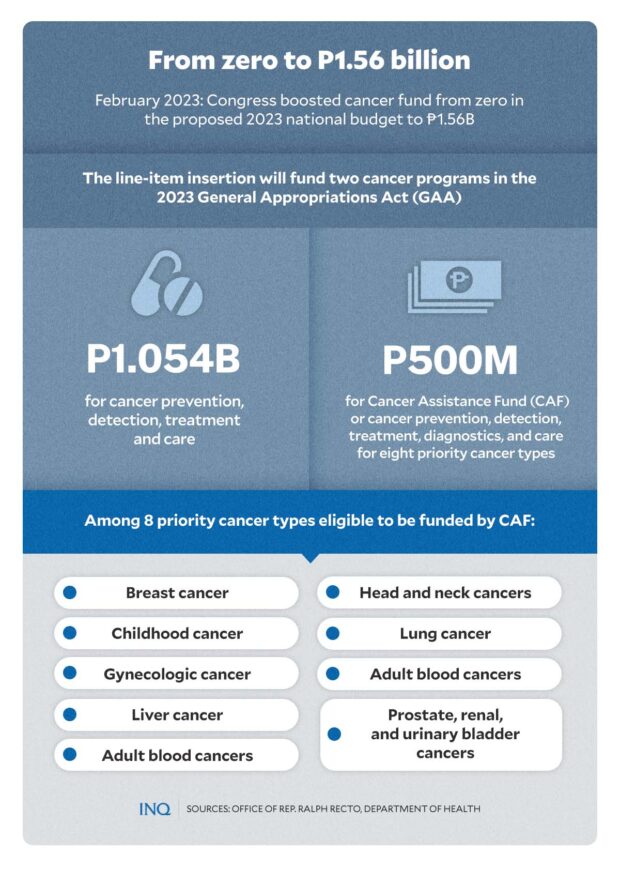
GRAPHIC Ed Lustan
The government has also restored the ₱1.56 billion funds for cancer in the 2023 General Appropriations Act (GAA)—which will subsidize cancer prevention, detection, treatment, and care, in line with NICCA and the Cancer Assistance Fund (CAF).
READ: More funding, assistance bring cancer patients closer to recovery
Despite these milestones, Dr. Jorge Ignacio, oncologist and chair of the Cancer Institute of UP-Philippine General Hospital (UP-PGH)—along with Cancer Prevention Advocate Rep. Jude Acidre and Kasuso Phil. Foundation for Breast Care Inc. volunteer Aileen Antolin—pushed to boost breast cancer awareness, detection, treatment, and care in the country.
More clinical trials pushed
In a forum held on Wednesday (April 19), Acidre stressed the need for better and more clinical trial studies on breast cancer conducted in the Philippines.
“If we are able to do more clinical trials or invest heavily in research and development, we can produce—or even hopefully develop—our own treatment mechanism that is locally available,” he explained.
According to Dr. Ignacio, there have already been several clinical trials conducted in the country, which gave cancer patients access to experimental cancer treatment drugs.
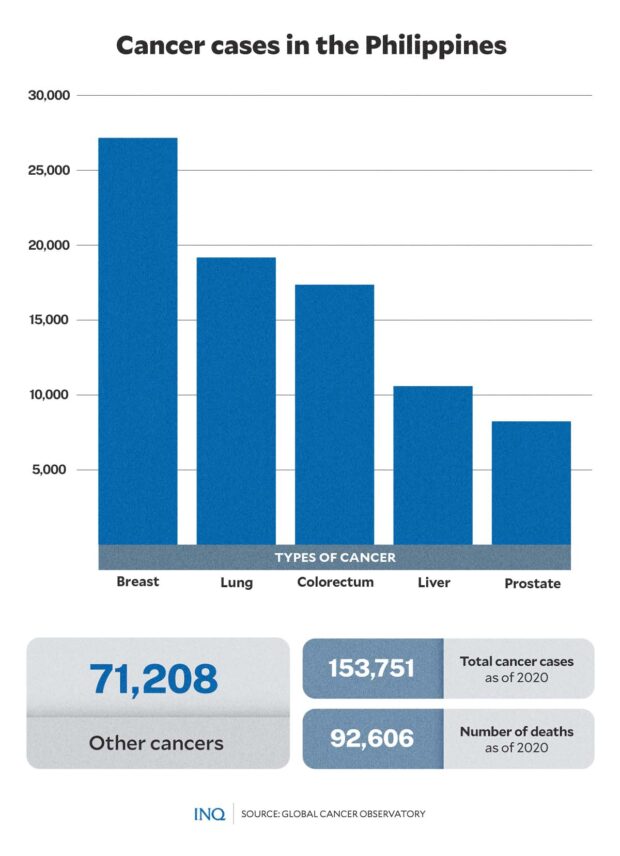
GRAPHIC Ed Lustan
However, both he and Acidre believe there is still a huge gap to fill when it comes to clinical trial opportunities for Filipino cancer patients.
“We have clinical trials here, but we can still improve by making [the country] more attractive to pharmaceutical companies. These big drug companies, multinational companies, they also need the economics of conducting clinical trials to help them not waste their resources,” Dr. Ignacio said in Filipino.
He added that one of the biggest issues with the clinical trials for cancer treatment in the country is the decentralized ethics review board—which is responsible for the approval of clinical trials and research projects.
Currently, each cancer center in the Philippines has its own ethics review board—which, Dr. Ignacio explained, slows down the process of clinical trials for cancer research. He emphasized that creating a centralized ethics review board could address the issue.
“In Singapore, they usually get a permit for clinical trial within three months, in the Philippines, you usually get it from six to ten months—and that’s the fastest,” said Acidre.
Patient hesitancy
When it comes to improving and conducting more clinical trials for breast cancer treatment in the country, Antolin underscored that there are other factors to consider—including the hesitancy of some cancer patients to participate in trials and studies.
“There are many considerations. Filipino patients still have hesitation when they are told that they are going to be part of a clinical trial. There’s a misconception that [they are going to be] lab rats or guinea pigs,” she shared in Filipino.
The hesitancy and misconceptions, Antolin said, could have an impact even when pharmaceutical companies and hospitals have already committed and prepared for clinical trials.
Another consideration that should be addressed, according to Antolin, would be the low health-seeking habits among Filipinos.
“We always emphasize that a reason why cases of breast cancer with late diagnosis continue to increase is that [patients] would rather wait until they are bedridden before they seek treatment,” she said.
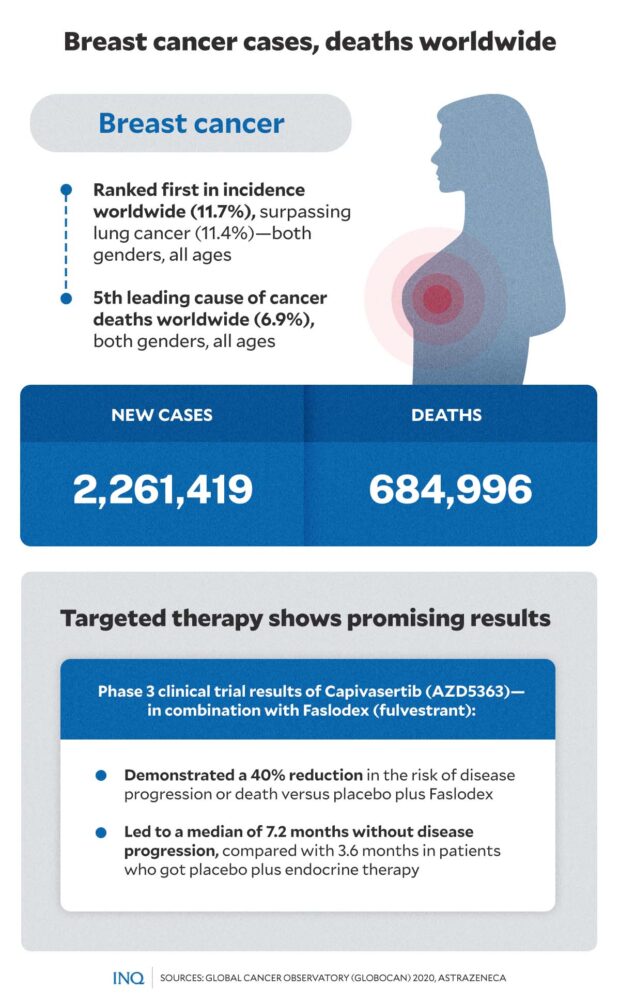
GRAPHIC Ed Lustan
“It is very important that we raise the level of awareness of people when it comes to early detection, especially since there is a stigma attached to [breast cancer],” she added.
A study by Valerie Ulep, a senior research fellow at the Philippine Institute for Development Studies (PIDS) released last month revealed that many Filipino women still do not have access to preventive screening for breast cancer.
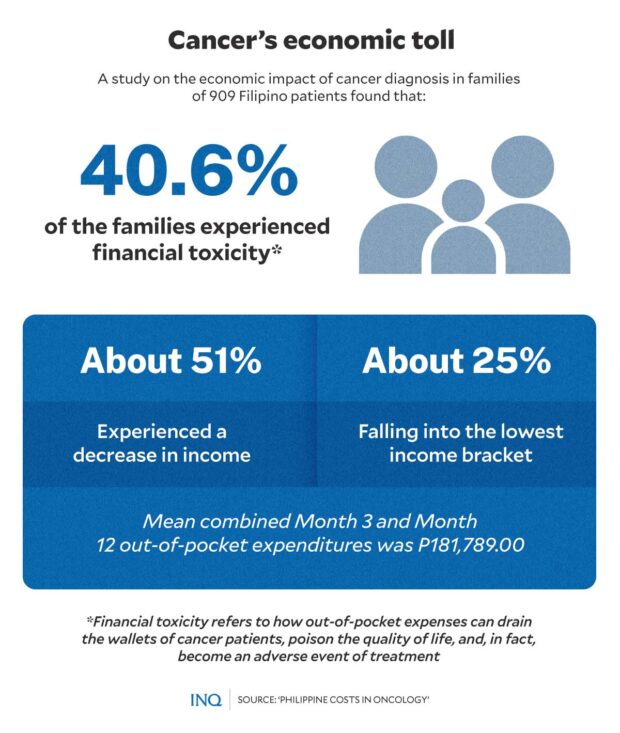
GRAPHIC Ed Lustan
“Breast and cervical cancer screening are extremely low in the Philippines compared to upper-middle and high-income countries,” Ulep explained.
“A big portion [of the] country’s cancer burden is preventable. However, it boils down to comprehensive preventative and curative interventions for the population,” he added.
READ: PH cancer patients lack access to preventive screening, costly treatment
A separate study published last year attributed low breast and cervical cancer screening among Filipino women to low health literacy and gender sociocultural pressures.
A health system review conducted under the Asia Pacific Observatory on Health Systems and Policies (the APO) and published by the World Health Organization (WHO) noted that among the multiple barriers causing low cancer screening are low health literacy, high out-of-pocket (OOP) health care costs, and the centralization of health care infrastructure and providers.
More specialists sought
Medical advances have made cancer preventable and treatable, helping many cancer patients in the country recover and win their battle against the “Big C.”
“We can beat cancer now. We can save lives. And we are trying our best to make treatment accessible nationwide, especially to those who cannot afford the treatment,” Dr. Marvin Mendoza, head of the oncology section at the National Kidney and Transplant Institute (NKTI), previously said.
However, despite the accessibility of cancer treatment and other support mechanisms that help with cancer prevention, detection, diagnosis, and care, Acidre said such progress would still require the skills and expertise of medical specialists—specifically oncologists—which, unfortunately, the country lacks.
“We need more trained oncologists. Technology can only go so much without the right professional medical personnel. Even if we have so much funding, so many treatment centers, without the right oncologist and a sufficient number of trained professionals [we will continue to face problems],” he said.

GRAPHIC Ed Lustan
During the forum, it was revealed that there are currently 348 oncologists in the Philippines—a figure which Dr. Ignacio verified as close to accurate.
According to Dr. Ignacio, there are at least ten oncologists in the UP-PGH alone. However, he clarified that there are several doctors under different specializations who accept consultations for patients who are diagnosed with cancer.
One way to address this problem, according to Acidre, is through establishing a cancer center and investing in oncology training “to develop the regional cancer centers for the respective level of oncologists then allow these cases to be the basis for evidence-based treatment.”